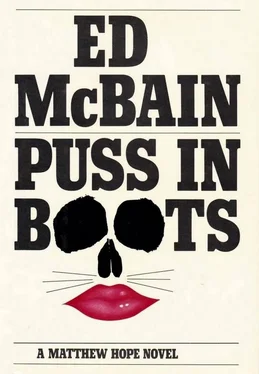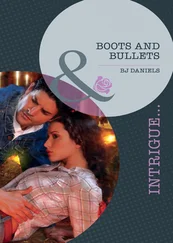“Help you?” somebody asked.
“Nope,” Warren said, without even turning to see who was talking to him.
“This is a movie we’re shooting here,” the voice said, and a body materialized in front of him, hulking, threatening.
Warren lifted his shades onto his forehead and beamed a cold, brown-eyed stare at the man. Big gorilla wearing blue jeans and a sweat-stained blue T-shirt. A grip, no doubt. They called them grips. Lotsa muscles, no brains, the longshoremen of the movie business. Warren reached into his pocket, took out his wallet, and flipped it open to the police shield they’d given him when he retired from the St. Louis PD. A fraction of an inch smaller all around than the buzzer he’d worn for five years, but looking like the real McCoy when you flashed it fast.
“Checking,” he said, and snapped the wallet shut, and turned away from the man, and over his shoulder said, “Where’s Vaughan Turner?”
“Setting up a shot there,” the man said. “Is there some problem?”
“No problem,” Warren said, and walked away from him, skirting the edge of the pool, which did not look too terribly inviting on a December day with the temperature at fifty-six degrees. Sunny Florida, he thought.
He knew better than to interrupt any of these shakers and movers when they were setting up a shot. Very temperamental, movie people were. You told them a hydrogen bomb had just been dropped over Calusa Bay, they’d say, “Move aside a minute, we have to adjust this flag.”
They were adjusting flags now, trying to get the lighting right. He’d picked up a lot of jargon back there on location in St. Louis — you hang around all day scratching your ass, if you had any brain at all in your head you began to understand the language these Martians spoke. They were shooting with an Arriflex on a tripod, what they called “sticks” because the legs were wooden. The man looking through the viewfinder was Vaughan Turner, one of the men Warren was here to see, Prudence Ann Markham’s usual cameraman (or cinematographer, if you wanted to get fancy). Turner looked through the viewfinder, then looked up and said, “Flag it on this side.”
He was talking to the lighting director, Lew Smollet, another man on Warren’s list. Smollet attached a square of white fabric to the gobo, cutting the light, and turned to look at Turner, who was peering through the viewfinder again. “Take it up to the top,” Turner said, and Smollet adjusted the flag again, and Turner nodded and said, “Okay, I want all these cables to go.”
A pair of grips began lifting and moving the cables that were snaked on the terrace. A girl in a bikini stood looking bored and chilly near the outdoor lounge chairs that were the real stars of the show. Smollet went over to her and held a light meter to her face.
“What’ve you got?” Turner asked.
“Eleven-sixteen split,” Smollet said.
“Okay, I’m ready,” Turner said. “Where’s Bud?”
“Right here,” a man said.
Obviously the director. Chief of all the Indians. Wearing jeans and a long-sleeved white Ralph Lauren sports shirt with a little blue polo pony and rider on the left pec. Smoking a cigarette, which he ground out on the terrace now. Turner stepped aside as he looked into the viewfinder.
“Looks fine,” he said. “I’m ready. Jane?”
“Ready,” the girl in the bikini said.
“Danny?”
A man in swim trunks, standing near the diving board, signaled with his hand.
“Okay, let’s go for it,” Bud said.
“Quiet, please,” the assistant director said.
A man sitting behind a sound cart — this had to be Mark Wiley, the third man Warren was here to see — took off his headphones and said, “Are we doing playback?”
“No,” Bud said. “Stand by, people.”
It was suddenly very quiet. Out beyond the pool, a pelican swooped in low over the gulf.
“Roll camera,” Bud said.
“Rolling.”
“Roll sound.”
“Speed.”
“Mark it,” the AD said.
A man holding a clapstick and standing just in front of the actress in the bikini said, “Thirteen B, take six,” and brought the black-and-white clapper down onto the slate on which the same information was chalked.
“Action,” Bud said, and the actor in the swim trunks began walking toward the actress in the bikini, who eased into one of the lounge chairs. As the actor approached her, he said, “Hi, honey,” and leaned in to kiss her. “Ready to relax on our Tropical—”
“Hold it, hold it,” Wiley said from behind his console, and looked out over the gulf. “Is there a plane out there?” he said. “A motorboat? Something?”
“Cut it, cut,” Bud said.
“Yeah, it’s a boat,” the AD said.
Bud sighed. “Okay, let’s wait,” he said.
Warren sighed, too.
They waited until the boat had gone by, and then they went through the same “Quiet please, standby, roll camera, roll sound, mark it, action” rigmarole another time. Bud cut again to tell his actors that he wanted the dialogue between them before Jane sat in the lounge chair. They rolled again, and again Bud cut to tell Smollet he wasn’t getting much of a shot, and would he please take another reading? Smollet put the light meter on the actress and gave him a new reading of eleven. They rolled again, and cut again, and rolled again, and cut again, and finally got the shot on the twelfth take.
“Okay, let’s move all these toys,” Bud said, and the grips started struggling the camera and the lights to the other side of the terrace.
Warren walked over to where Turner was telling one of the grips to “head wrap” something.
“Mr. Turner?” he said.
The thing Mose and Tick liked most in the whole world was money.
They also liked girls and dope, but they figured if you had money, the girls and the dope followed as the night followed the day.
Ever since they’d heard about Prue’s murder almost three weeks ago, they’d been following the case with more than casual interest, reading the newspapers, watching all the television coverage. It seemed that her wimpy husband who ran a clock shop had done the lady in. It seemed this very same wimp was being held without bail and being defended by yet another wimp who, from what Mose and Tick could gather, had hardly ever handled a criminal case in his entire career. It seemed that the state attorney’s office was going for the death penalty, and it further seemed they had a damn good chance of getting it.
None of this interested Mose and Tick.
Money interested them.
Which was why the omissions in the news coverage captured their singular attention.
When a good-looking twenty-eight-year-old blonde gets murdered in staid Calusa, that’s headline news, man. Especially if the murder is a stabbing. Knives are scary. Hardly anybody knows what it feels like to get shot, but everybody has cut himself accidentally and knows how that can hurt, man, and knows how the sight of all that blood welling up can turn you pale with fright. Stabbings made good headlines. Newspapers loved headlines dripping blood. Television reporters loved talking about stabbings, too. They could show pictures of pools of blood soaking into the ground, and they could show the bloody knife, or a reasonable facsimile of the bloody knife, turning slowly under a harsh light that sent little pinprick reflections of terror darting out into the viewer’s living room. Brutal stabbings brought out the very best in news reporters.
Which is why Mose and Tick found it peculiar that none of the newspaper or television reporters had once mentioned that the good-looking twenty-eight-year-old blonde who’d been found floating in her own blood had been directing a skin flick.
Читать дальше












